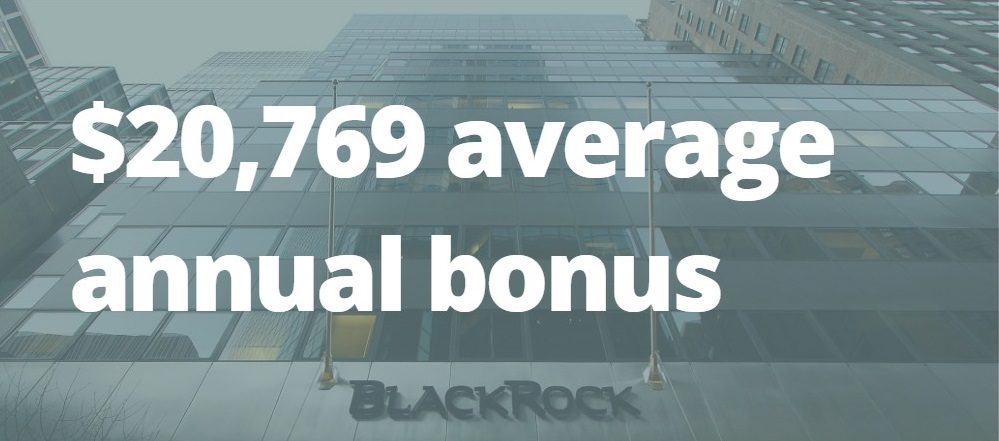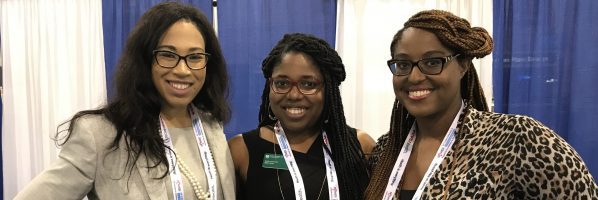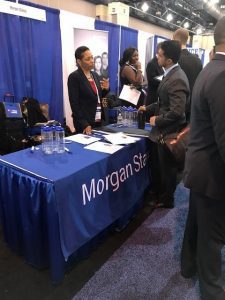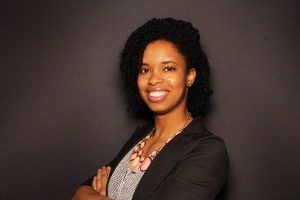MBA Job Opportunities: BlackRock

Though many MBA grads are passionate about their career prospects, those driven to work in the financial industry may be more reticent to commit to a life of uncomfortable suits and harsh fluorescent lights. A TINYpulse study found that employees at financial service companies have some of the lowest career satisfaction rates out there, despite stable salaries. The study put the amount of financial service employees who are happy with their work environment at less than 22 percent. In fact, an eFinancialCareers study found that one third of bankers hate their jobs. So, does an MBA and a penchant for finance mean a life of tolerating punishing work hours with little recognition from colleagues and superiors? Not necessarily.
Recent MBA grads with a penchant for finance will be pleased to learn that BlackRock, Inc., one of the largest asset-management companies in the world, provides a different kind of environment from the majority of financial institutions. Business Insider consistently ranks BlackRock as one of the premier financial employers in the U.S, writing, “The firm is big on employee development plans and employee engagement. For example, employees get to pitch ideas to senior executives at the two-day Innovation Summit, which helps spur new products for retirees and connect coworkers across different departments, according to LinkedIn.”
Why Work at BlackRock?
In a Business Insider interview, Jeff Smith, Senior Managing Director at BackRock’s Head of Global Human Resources Group, called BlackRock, “… an incredibly passionate place with a very clear sense of purpose that comes from Larry Fink, our founder and CEO, to everyone else in the company.”
BlackRock is renowned for its relaxed corporate culture, and 73 percent of its employees report high job satisfaction. The company employs over 130 investment teams in 30 different countries, so there is ample opportunity to join BlackRock beyond its New York City headquarters.
BlackRock’s effort to create a successful and diverse environment has been nothing short of empowering. Since 2015, over 2000 of the company’s prominent employers joined in the “Driving Better Decisions” initiative, which aims to help remove “unconscious bias” in decision-making, according to the official BlackRock website, as well as rethink the way human resources recruits and develops diverse talent. While the gender ratio at the company is still predominantly male, BlackRock has also made a concerted effort to increase female employment in senior management roles to 30 percent by the end of the decade, signing the HM Treasury’s Women in Finance Charter.
Pay Day
According to recent PayScale survey figures, MBA grads, despite their role, earn around $86,000 annually at BlackRock. These figures fluctuate depending on the specific role, rising to as much as $316,000 per year for investment strategists. According to the same data, bonuses at the company are also pretty exceptional. Portfolio managers reported an average bonus of $39,000 per year, while even the lowest bonus figures neared $10,000 per year.

Figures according to PayScale data.
Interning at BlackRock
For students nearing the end of their higher education journey, BlackRock offers summer internships for a glimpse of life at the company. BlackRock’s global Analyst Program is a two year-long entry level program for new graduates. The program kicks off with a training in New York City. Throughout the program, trainees will develop their skills in communicating with clients and understanding how to help them manage fiduciary matters.
BlackRock offers several other internships, and is conscious of promoting diversity in their industry. The Founders Scholarship provides merit rewards and a summer internship to students who identify as Black, Hispanic, Native American, LGBTQ, or disabled. Merit awards for this scholarship can be as high as $15,000.
Getting Hired
In an interview with eFinancialCareers, Jonathan Jones, director of global campus recruiting at BlackRock, gave some insight into how interested candidates can get their foot in the door at the company.
“What I think makes a BlackRock person stand out though, is that we look for people who embody or represent our principles. For example, we have a commitment to innovation. Innovation—original thinking, problem solving, and creativity – is central to our identity. Equally, we have a strong commitment to teamwork, and we look for people who can join the dots between our disparate activities in ways which can solve problems for our clients,” Jones said.
According to Jones, BlackRock hires many recent university graduates with Bachelor’s degrees, and the company also hires MBA candidates who have work experience that is relevant to specific positions, such as real estate and equity research.
A recent highlight from Clear Admit on the best business school’s for MBA grads that want to break into the industry that these five schools produced the most finance employees:
- Columbia Business School
- University of Chicago Booth School of Business
- New York University Stern School of Business
- University of Pennsylvania’s Wharton School
- Cornell Johnson Graduate School of Management
BlackRock has been actively recruiting at the world’s high ranking universities, stopping by Columbia Business School as recently as last month for an information session. Read here to find out for more events the company is hosting in the coming weeks and months and check out more about a potential career with BlackRock below.
The Top 5 Reasons Diversity MBA Conferences Should Be on Your Recruiting Calendar

Pictured above: Tuck second-year MBA students Bianca Goins, Sadé Lawrence, and Jodine Gordon.
More than 10,000 MBA students, business school representatives, recruiters, and business executives filled the Pennsylvania Convention Center in Philadelphia late last month for one of the largest career conferences serving minority professionals. The conference has been around since 1970, but for the first time this year the National Black MBA Association (NBMBAA) and Prospanica, the association of Hispanic professionals, joined forces to present it. The result was an incredible opportunity for attendees to network with companies and each other, take advantage of career development programming, and interview for and secure job offers from hundreds of companies spanning multiple industries.
Cornell’s S.C. Johnson Graduate School of Management had a group of approximately 55 students attend, a mix of first-year and second-year students, according to Cynthia Saunders-Cheatham, Executive Director of Johnson’s Career Management Center.
“It was double what we have had in recent years, and perhaps the largest attendance we ever had for an MBA diversity conference,” she said. “Having a joint NBMBAA/Prospanica conference, in addition to the Philadelphia location that was driving distance away [from Ithaca, NY, where Johnson is located], helped to drive attendance.” The connections that students made while there have already resulted in multiple job offers, she added.
While securing a job or internship is a primary reason many MBA students choose to attend the National Black/Prospanica conference and others like it, that’s just one of many potential benefits events like this offer. Given that this most recent conference was right here in our hometown of Philadelphia, we went to check things out for ourselves. Through conversations with attendees, school representatives, and recruiters, we’ve compiled the following list of reasons why this year’s crop of applicants should be sure to add diversity MBA conferences to their recruiting calendar next summer and fall.
1. Unparalleled Recruiter Access—Including Many That Don’t Come to Campus
The Career Expo, which took place on the last two days of the five-day National Black/Prospanica conference, filled a cavernous hall in the Convention Center and included booths from close to 300 companies spanning dozens of industries. Among them were coveted post-MBA tech employers like Google and Amazon, consulting industry leaders including Bain & Company and Accenture, and financial services firms such as BlackRock, Bank of America, and Morgan Stanley. There was a continuous gaggle at the Google booth, and one of its MBA internship recruiters, Tanya Choudhury, had to resort to wearing a sign by the second day explaining that she’d lost her voice.
Big pharma and healthcare were also well represented, with booths attended by recruiting representatives from drug maker AstraZeneca to medical products and equipment company Zimmer Biomet and many in between. Leading consumer packaged goods (CPG) firms including PepsiCo, General Mills, and Proctor & Gamble were also there, as were oil and gas giants like BP, Chevron, and Exxon.

Morgan Stanley was one of almost 300 exibitors in the conference’s packed Career Expo.
But there were also plenty of organizations that are perhaps less top of mind as potential MBA recruiters—the Central Intelligence Agency, the U.S. Department of State, Teach for America, and USAID, for example—who were just as eager to share how highly they value the MBA skillset. Dozens of leading business schools also had booths, largely to provide support and serve as gathering places for students who were attending, but also with an eye out for promising diverse talent. For example, Roberto Martinez, a Senior Talent Acquisition Consultant for Dartmouth College—home to the Tuck School of Business—was eagerly distributing glossy handouts touting the school’s varied career opportunities, commitment to diverse hiring practices, and excellent benefits. “We’re here not only to support students but also to hire more diverse staff to campus,” he said.
For Tuck second-year MBA student Bianca Goins, the breadth of companies at the expo was a big part of the draw. “I wanted a diverse group of companies to look at in a single spot,” she said. “There are so many companies here, and as second-year you can really come and pick and choose the experiences you want to have.”
Tiffany Anderson, a second-year student at Emory’s Goizueta Business School, was also impressed by the sheer number of companies present. A self-proclaimed conference veteran, she also attended National Black last year, as well as conferences presented by the Forté Foundation, the Consortium for Graduate Study in Management, Management Leadership for Tomorrow, and JumpStart. “Out of all the diversity conferences, I would certainly say this is the flagship,” she said. “Wow! There are A LOT of companies here,” she recalled thinking to herself as she walked in. More so than last year, before National Black and Prospanica teamed up, she added.
“I have seen the most people—students from many different schools and recruiters from many different functional areas of interest,” she continued. “It seems to be the most diverse in terms of attendees, degree of programming, and companies in attendance. For the majority of people, this is going to be one of the best to attend.” Anderson estimates that there were probably 30 or so Goizueta students there, a mix of first- and second-years.
2. Multiple Touch Points and Opportunities for Face Time
For some students, certainly, the primary purpose in attending the conference is to land a job. Second-year IU Kelley School of Business MBA student Henrique Barbosa, a native of Brazil pursuing travel hospitality, had a simple answer when asked why he was there: “To get a job!” He acknowledged that most of the firms he was interested in only conduct first-round interviews at the conference followed by second-round interviews on site, which lessened the likelihood of his leaving with an offer in hand. “But it would be great if it happened,” he said.
But several other students were less interested in job or internship offers—or even in early round interviews. For Jodine Gordon (Tuck ’18), the biggest factor in her decision to attend was hearing success stories from Tuck grads whose higher-level touch points with conference recruiters later helped them secure offers. “I have a couple companies on my list, but really I just want to meet as many people as possible so they can get to know me and I can get face time,” she said.
Sadé Lawrence, also a second-year student at Tuck, was likewise attracted by the opportunity to get in front of recruiters in person. “For a lot of opportunities you might be interested in, you start online at a website, applying through data base,” she said. “But coming here they now have a face with your name, and there are all kinds of organic connections that can happen,” she added. “It’s kind of amazing that you are able to build connections with people even at such a big conference, but you are. You make contacts and get lots of face time—so much more so than you can blindly through a website,” she continued. “What I have heard more of is people have an interaction with a recruiter here that leads to an interview later—here is more about entering the pipeline.”
Tuck’s Goins has taken the opportunity to network with recruiters who don’t make it to Tuck’s campus, but also those who do. “With every interaction, you are getting a more nuanced understanding of the company and can take that information and use it in subsequent interactions.”
3. Valuable Chances to Network with Peers
Goizueta’s Anderson interned in operations at Google over the summer—an opportunity she got through another diversity conference—and has been offered a full-time position on the tech giant’s Mountain View campus after she graduates. Despite having that full-time offer in hand, attending the conference still made lots of sense.
Kelley School second-year student Luis Vilchez Kupres, a native of Peru, also converted his summer internship—in supply chain operations at Cummins—into a full-time offer. So his reasons for attending the conference were not to get a job. ”I am here to support fellow Kelley first- and second-years and network a little more,” he said. He also gets to reconvene with students from other schools he met at last year’s Prospanica conference. “Often, you connect with somebody and they will help you connect with someone else,” he said. “Networking definitely helps—even among other MBA students.”

Tiffany Anderson, Goizueta MBA ’18, a diversity MBA conference veteran
For the Google-bound Anderson, the value of peer networking can’t be stressed enough. Being able to connect with students from other schools is the part she finds most enjoyable—but it’s also strategic. “When candidates are selecting a school they like to look at the size of the network they are going to get—and that’s great,” she said. “But the way I see it, I don’t have to be at Stanford or Wharton because I have friends at Stanford and Wharton. So in a way that’s kind of my network, too.”
“You have that domino effect,” she continued. If she’s trying to connect with someone at a company where she doesn’t have a contact or her classmates don’t have contacts, she can reach out to a friend at another school to see if there’s someone in their network. “Some might say, ‘Well, they’re a peer, they’re not an employer, they’re not going to get me a job.’ But there is so much more benefit to expanding your network. I don’t think everyone understands that.”
Of course, peer networking can be a two-way street. “My motivation to expand my network comes from wanting to help others as well,” Anderson said. “When you are part of these diversity networks, one of the great things is you are going to have a friend who says, ‘Do you know someone who can help me with this?’ And I can say, ‘Well, I met someone at a conference who does that very thing and I’m happy to put y’all in touch.’”
Oxford Saïd Expands New Global Council & Responsible Business Forum

Like many leading MBA programs in the global arena, the University of Oxford Saïd Business School is continually working to enhance its opportunities for students, professors and alumni. Most recently, the school expanded its global reach with the establishment of a new Global Leadership Council, which has the goal of advancing the school’s business education model. In addition, the second annual Responsible Business Forum provided a platform for the next generation of business leaders to address social and environmental issues.
Both the Council and the Forum brought together global companies and educational stakeholders to support the development of mutually beneficial relationships. Continue reading…
